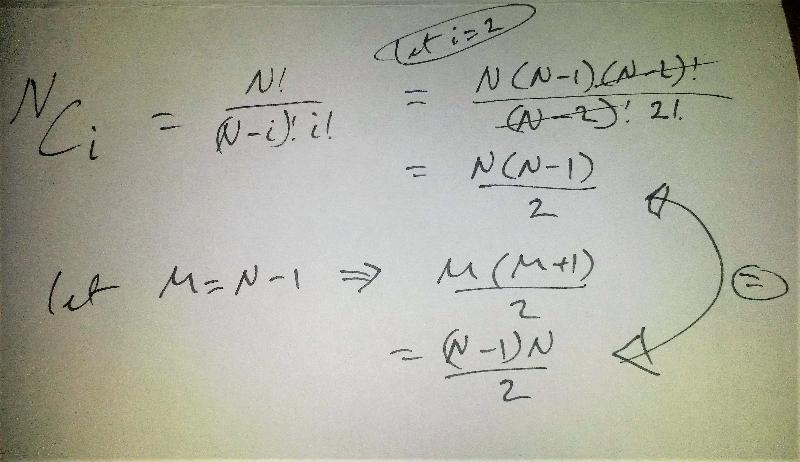xenium
asked on
Easy maths question
In a network with N nodes, what's the maximum number of connections you can make?
eg N=2, gives 1 connection, N=3 gives 3, N=4 gives 6, N=5 gives 10, N=6 gives lots etc
I think it's sum of N-i from i=1 to N-1
How many when N=100?
Can I simplify this in terms of N only and what's the function called in maths and/or in Excel or google sheets?
Probably easy but it's been years since i did maths.
Thanks!
eg N=2, gives 1 connection, N=3 gives 3, N=4 gives 6, N=5 gives 10, N=6 gives lots etc
I think it's sum of N-i from i=1 to N-1
How many when N=100?
Can I simplify this in terms of N only and what's the function called in maths and/or in Excel or google sheets?
Probably easy but it's been years since i did maths.
Thanks!
SOLUTION
membership
This solution is only available to members.
To access this solution, you must be a member of Experts Exchange.
In excel you can use below formula assuming your data starts from A1:
=SUMPRODUCT(LARGE(A1:A100,ROW(INDIRECT("2:100"))))ASKER
I assume we don't need arrays.
If N choose 2 is the right answer then i can just use that formula, i assume Excel has the function, else a factorial version
If N choose 2 is the right answer then i can just use that formula, i assume Excel has the function, else a factorial version
ASKER
eg
=FACT(100)/(2*FACT(100-2))
=FACT(100)/(2*FACT(100-2))
ASKER
or
=COMBIN(100,2)
=COMBIN(100,2)
ASKER
Now i think about it, it all makes sense. THe number of connections is the number of ways you can choose two nodes from the whole set.
ASKER
Thanks all for your input and helping me get to an answer quickly.
Are you asking a question or testing us? If you already did your homework.
Why you need to send close request? right away accept Shaun's solution and it will close automatically.
Why you need to send close request? right away accept Shaun's solution and it will close automatically.
In a network with N nodes, what's the maximum number of connections you can make?Consider this:
eg N=2, gives 1 connection, N=3 gives 3, N=4 gives 6, N=5 gives 10, N=6 gives lots etc
I think it's sum of N-i from i=1 to N-1
Starting with "n" nodes, each node added gets N nodes.
Each node added, adds "n" connections.
So the formula is a sum of added connections.
The number of connections is a sequence: 1,2,3,6,12,
1 to 2 adds 1 for 1 total
2 to 3 adds 2 for 3 total
3 to 4 adds 3 for 6 total
4 to 5 adds 4 for 10 total
99 to 100 adds 99 >> so we will call M=N-1 as the sequence ends at N-1
SUM over k=1:M (1:k-1) which is done with a well-known formula M*(M+1)/2
Check:
M=1>>1*(1+1)/2=1
M=2>>2*(2+1)/2=3
M=3>>3*(3+1)/2=6
M=4>>4*(4+1)/2=10
.
M=99>>99*(99+1)/2=4,950
In this case, you have to be careful because there are N nodes and N-1 added connections. Thus M=N-1
How many when N=100?4,950
Can I simplify this in terms of N onlyYes. As above.
what's the function called in mathsPartial sum of integers
and/or in Excel or google sheets? SUM
Incomplete answer
ASKER
Thanks Fred, that's a good point. I will request to defer closing so I can re-assign points.
ASKER CERTIFIED SOLUTION
membership
This solution is only available to members.
To access this solution, you must be a member of Experts Exchange.
I rather hate to do this but it seems technically proper if not socially proper....

ASKER
Just guessing it seems to be N choose 2, that googles to the right answer for 100
Is that right?